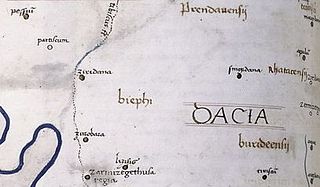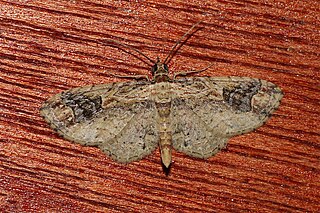
Moths are a polyphyletic group of insects that includes all members of the order Lepidoptera that are not butterflies, with moths making up the vast majority of the order. There are thought to be approximately 160,000 species of moth, many of which have yet to be described. Most species of moth are nocturnal, but there are also crepuscular and diurnal species.

Pecica is a town in Arad County, Romania. In ancient times it was a Dacian fortress called Ziridava and today it is an important archeological site. Situated at 25 kilometres (16 mi) from Arad, it was declared a town in 2004. Its administrative territory extends into the Arad Plateau. The town administers three villages: Bodrogu Vechi (Óbodrog), Sederhat (Szederhát) and Turnu (Tornya).
Ziridava is a genus of moths in the family Geometridae.

Eupitheciini is a tribe of geometer moths under subfamily Larentiinae, often referred to as pugs. The tribe was described by Tutt in 1896.

Zurobara was a Dacian town located in today's Banat region in Romania. It is positioned by the Tibiscus river, north of Zarmizegethusa Regia and south of Ziridava. It was near the Tisza river, in the area of the Dacian tribe of Biephi.

Şanţul Mare is an important archaeological site located 9 km west of Pecica, Arad County, Romania, near the border with Semlac commune and 600 m from the Mureş River.
The Arad Museum Complex is primarily a history and archaeology museum in the city of Arad, Romania.

Ion Horaţiu Crişan (1928–1994) was a Romanian historian and archaeologist. He conducted research in South-Eastern and Central Europe, focusing on Geto-Dacians and Celts.

Ziridava was a Dacian town located between Apulon and Tibiscum, mentioned by Ptolemy in the area of the Dacian tribe of Biephi.
Ziridava xylinaria, the indistinct carpet, is a moth in the family Geometridae. The species was first described by Francis Walker in 1863. It is found in Sri Lanka, India, Hong Kong and on Peninsular Malaysia, Borneo, Java and possibly the Philippines and Sulawesi.
Ziridava gemmata is a moth in the family Geometridae. It is found on the Solomon Islands and the Bismarck Archipelago.

Ziridava kanshireiensis is a moth in the family Geometridae. It is found in Taiwan and on the Philippines, Borneo and Peninsular Malaysia.
Ziridava baliensis is a moth in the family Geometridae. It is found on Bali and Flores.
Ziridava khasiensis is a moth in the family Geometridae. It is found in the north-eastern Himalayas.
Ziridava rubridisca is a moth in the family Geometridae. It is found in southern India and Sri Lanka.
Ziridava rufinigra is a moth in the family Geometridae. It is found on Borneo and in India, New Guinea and Queensland.
Ziridava asterota is a moth in the family Geometridae first described by Louis Beethoven Prout in 1958. It is found on Borneo.





